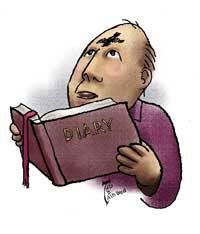Agents of Forgiveness
., is a professor of New Testament Studies at Catholic Theological Union in Chicago, Ill.
How can you ever forget the past, when it has been hurtful? Maybe there is something I have done for which I cannot forgive myself or some hurt another has inflicted on me that I cannot let go. “Remember not the events of the past”—that is what God says to Israel at the end of the exile in Babylon. It is not that the Holy One is asking the people to pretend the exile never happened. They could never forget the utter upheaval of their lives: being torn from their homes and forced into exile in a foreign place, where they had to try to piece back together the shreds of their lives where nothing was their own. Such a thing could only have occurred as a punishment for their sin, they reasoned.
The prophet Isaiah says otherwise. God complains, “You burdened me with your sins, and wearied me with your crimes” (Is 43:24). Focusing on their own sinfulness as they call out to God, they do not perceive that God is doing something new. Israel forgets it is God’s own beloved people, formed in the divine image so as to announce God’s praise. God no longer remembers their sins; nor should they. Like them, we are to dwell not on our dismal failures but rather on the boundless graciousness of God (Jl 2:13), who heals our memories and frees us for love in each new moment.
This Sunday’s Gospel highlights how very difficult it can be to give and receive forgiveness. A man who was paralyzed in body and spirit needs the help of four friends to bring him to a place of forgiveness. Sometimes, when we are so tied up by our unforgivingness, we need others to help move us toward the source of healing. Obstacles may seem insurmountable, but the faith of others can carry us at such times. As the man and his friends break through the roof, the first thing Jesus does is to remind the person with paralysis that he is a beloved child (teknon) of God. The word teknon does not necessarily connote a young person, but can mean a cherished son or daughter of any age. Jesus then declares, “Your sins are forgiven.” Using the passive voice is a way of saying that it is God who does the forgiving. Controversy then swirls around Jesus. Who can claim to be an agent of divine forgiveness?
In our day, those who have studied the dynamics of conflict transformation have shown that it is the injured party who has the power to begin a process of reconciliation by offering forgiveness to the perpetrator of the hurt. In an ideal exchange, such a gracious act brings the one who inflicted the harm to repent of his or her wrongdoing and attempt restitution. The two parties then commit themselves to create a new, reconciled future. This is an enormously difficult process. It is, as Sunday’s Gospel points out, very hard to embark on a journey of forgiveness and reconciliation; it is easier to raise up a person who cannot walk than to let go of a paralyzing lack of forgiveness toward self and others (Mk 2:9).
Forgiveness is not something that we can conjure up by the strength of our will. Rather, it is God’s endless mercy at work through Jesus that enables us to receive this divine gift, which then impels us to extend it to others. It is a glorious thing when we are so freed by love—like a resurrection and like learning to walk anew. We can open ourselves to this gift by practices of prayer, fasting and almsgiving, as the Gospel for Ash Wednesday reminds us. These are not ways to parade our piety. Instead they help us to acknowledge our sins, then let God’s healing power transform us into ambassadors of reconciliation (2 Cor 5:20).
This article also appeared in print, under the headline “Agents of Forgiveness,” in the February 16, 2009, issue.








